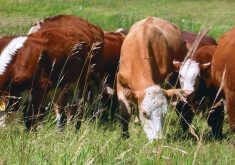The fight to cut U. S. farm subsidies is just beginning in Congress despite a committee vote against a $250,000-a-year cap on payments, a limit supported by the White House, Agriculture Secretary Tom Vilsack says.
“Let’s see where things end up,” Vilsack said during an interview with Reuters March 27. He said deficit hawks in Congress would press for cuts and there are many ways to reach the goal of focusing farm subsidies on family farmers.
“I think there will be discussions about crop insurance. There will be discussions about a wide range of things within the ag budget. The process is just starting.”
Read Also

Mazergroup’s Bob Mazer dies
Mazergroup’s Bob Mazer, who helped grow his family’s company into a string of farm equipment dealerships and the main dealer for New Holland machinery in Saskatchewan and Manitoba, died July 6 from cancer.
One step toward that goal, Vilsack said, was a plan announced on March 19 for the Agriculture Department to check with the Internal Revenue Service to see if people are eligible for farm payments.
“It’s going to be a relatively small number of people who are going to be checked,” said Vilsack. He put the figure at one-quarter of one per cent of recipients. USDA says it will not receive actual tax data for a farmer.
But nine Republicans on the House agriculture committee say it is unfair that all farmers will be required to sign a waiver that allows the IRS to share information with USDA.
Farm groups have said little on the issue. It would be a black eye to appear to defend cheaters, said one lobbyist.
The 2008 farm law is the first to ban payments to the wealthiest Americans. It bars crop subsidies to people with more than $500,000 in adjusted gross income from off the farm. People with more than $750,000 AGI from agriculture are ineligible for the direct-payment subsidy.
President Barack Obama proposed $16 billion in cuts over 10 years in crop supports and crop insurance subsidies, including a $250,000 cap on annual payments.
Vilsack also said that the food safety group created by the White House should consider whether USDA should have stronger meat recall power. As well, he is willing to meet opponents of a mandatory traceback system. “We want a system that works,” he said. Participation is low in the current voluntary system.


















